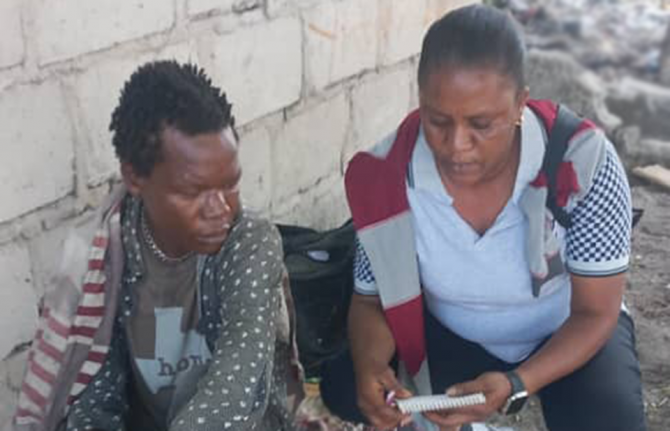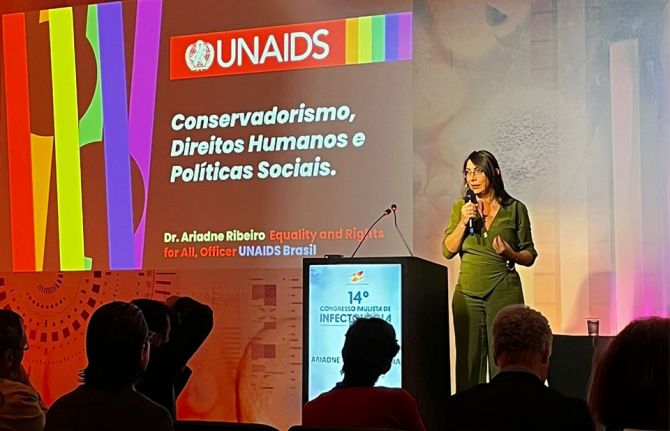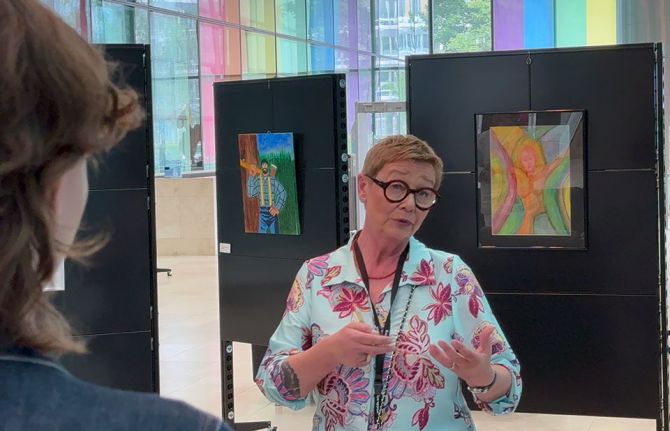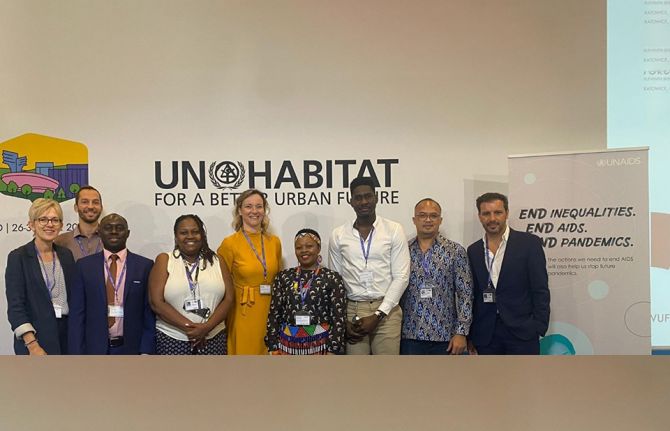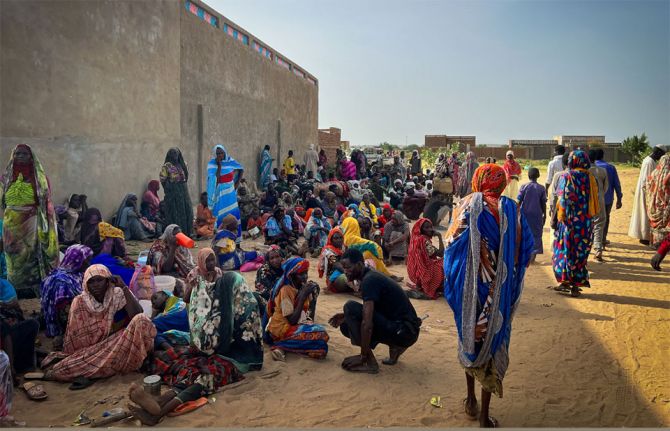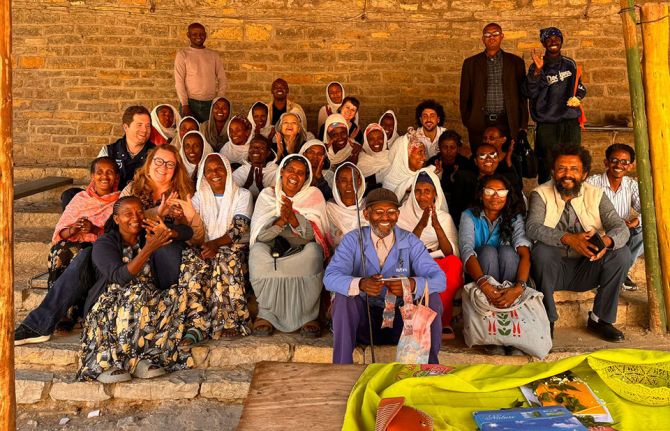
Feature Story
Talking about a revolution: HIV Prevention focus for UNAIDS social media initiative
26 October 2010
26 October 2010 26 October 2010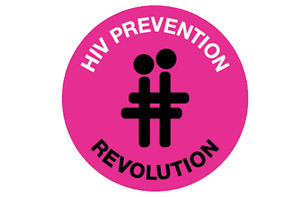
“More than 7000 people are infected with HIV every day. We need a prevention revolution.” This is the message that UNAIDS is using today to launch a social media initiative across twitter and facebook to revitalize interest in HIV Prevention in the lead up to World AIDS Day 2010.
Starting 26 October, for six consecutive Tuesdays, UNAIDS will introduce a series of themes related to HIV prevention via discussions on facebook and Twitter and through YouTube clips, interactive polls and quizzes. As part of the initiative, five animated films have been developed as conversation starters.
The aim is to inspire and encourage people using social media to know more about HIV prevention, as well as to make the keyword (or hashtag as it is known on Twitter) #PreventionRevolution trend on Twitter in as many places as possible on 1 December 2010.
HIV spreads through networks, but networks are also the best defense when people are informed and empowered to protect themselves
Michael Bartos Chief of Prevention, Risk and Social Vulnerability
The social media project will reinforce the work of the recently launched High Level Commission of HIV Prevention, whose stated aim is to bring about a prevention revolution. Many of the commissionaires are already using social media to raise awareness about HIV prevention.
“HIV spreads through networks, but networks are also the best defense when people are informed and empowered to protect themselves,” said Michael Bartos Chief of Prevention, Risk and Social Vulnerability with UNAIDS. “Using social media is a natural progression for UNAIDS’ goal of raising awareness and bring about progressive social change.”
The concept was developed in dialogue with the MTV Staying Alive campaign, which is also supporting the initiative.
Find out more, visit UNAIDS on facebook: http://on.fb.me/95aBoI
Where the twibbon: http://twb.ly/bQSXBj

Feature Story
Use light to highlight rights this World AIDS Day
25 October 2010
25 October 2010 25 October 2010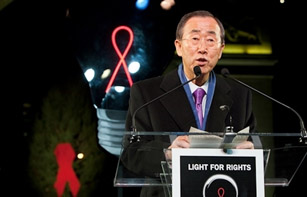
UN Secretary-General Ban Ki-Moon speaking at the "Light for Rights" event during the World AIDS Day celebrations in New York City in 2009.
The first Light for Rights: Keep the light on HIV and human rights event was held on 1 December 2009 in New York. The United Nations Secretary-General Ban Ki-moon joined leaders in the AIDS response and entertainment stars to commemorate World AIDS at the City’s historic Washington Square Park Memorial Arch.
Lights on the arch and other landmarks around the city were turned off to remember family and friends lost to AIDS, and to represent how stigma, discrimination, fear and shame can drive people living with HIV into darkness. Then, the lights were re-lit to show how shining a human rights light on HIV can help people living with HIV emerge from the shadows, to seek the information, treatment, care and support.
Light for Rights was inspired by Night without Light, a project organized by Visual AIDS in the early 1990s in which the skylines of New York and San Francisco were darkened, by turning off the architectural illumination on key landmarks, as a symbolic reflection for the lives lost due to HIV.
The Light for Rights campaign sends a message of hope to the world
Michel Sidibé, Executive Director of UNAIDS
The Light for Rights campaign compliments the theme for this year’s World AIDS Day: human rights and universal access. The year, it encourages 100 cities around the world to dim the lights on public landmarks to remember the devastating affect AIDS has had, and to turn the lights back on to illuminate the fundamental human rights shared by all but often denied people living with HIV.
“The Light for Rights campaign sends a message of hope to the world,” said Michel Sidibé, Executive Director of UNAIDS. “The power of light can convey the message that human rights are essential to the AIDS response.”
The Lights for Rights initiative is organized by a coalition comprised of The World AIDS Day campaign, UNAIDS, amfAR, and Broadway cares/Equality Fights AIDS. To find out more about how to organize a Lights for Rights event in your community or city this World AIDS Day visit the Light for Rights web site (www.lightforrights.org).

Feature Story
Growing concerns over rights and treatment of LGBT people in high-income countries
22 October 2010
22 October 2010 22 October 2010UNAIDS speaks with organizations in North America and Europe to better understand patterns of human rights violations and the connections to health

Caption Credit: UNAIDS
The recent suicides among gay teens in the United States of America (USA) after bullying and cruel treatment because of their perceived sexual orientation highlights the fact that homophobia continues to exist in all societies. Despite acceptance in popular culture in many countries, young lesbian, gay, bisexual and transgender people (LGBT) can face some of the same barriers presented by stigma and discrimination as previous generations.
“Violence against members of the LGBT community is unacceptable, no matter where in the world it occurs,” Michel Sidibé said UNAIDS Executive Director. “Governments must fulfill the rights of all people, regardless of sexual orientation and gender identity.”
A public opinion poll conducted in the USA in May this year found that while more than half of Americans believed that gay and lesbian relationships were acceptable, 43% still feel that such relationships are morally unacceptable.
“Clearly homophobia remains a serious problem in the United States, but I think we’re heading in the right direction—just not quickly enough,” says Chris Collins, Vice President and Director of Public Policy for the American Foundation for AIDS Research (amfAR).
In the wake of recent anti gay-violence, a USA faith alliance called on the Universal Church to work to “end the violence and hatred against out lesbian, gay, bisexual, and transgender brothers and sisters.”
Institutional homophobia is easier to pin-point as discriminatory, such as punitive laws criminalizing same sex behaviour. However negative attitudes towards members of the LGBT community can exist even when protective laws are in place, and these are more difficult to address.
University student Emily Carson, a member of the Global Youth Coalition of HIV/AIDS, is from Connecticut, a state which has protective laws. Growing up in a small conservative town Ms Carson said she was harassed and bullied for years, because she was perceived as different. When first hearing about the suicides among gay teens in the US, Ms Carson said she was heartbroken. She had hoped schools had gotten better.
Violence against members of the LGBT community is unacceptable, no matter where in the world it occurs
Michel Sidibé, UNAIDS Executive Director
But Ms Carson also has a different worry: “Every few years this happens (gay kids committing suicide or the political cycle of the gay marriage debate), and people start talking about anti-homophobia. I worry that this public outcry is going to die down until the next time something happens,” she said. “We need to pay attention to this on a daily basis, not only when there is a tragedy involved.”
Social change requires more than legal reform, and the situation is similar in Europe. German-born Alex Müller, a board member of the International Lesbian, Gay, Bisexual, Transgender and Queer Youth and Student Organization (IGLYO), agrees: “On the one side there is legislative progress in Europe, but at the same time homophobic perceptions prevail in all parts of society.”
Reported hate-crimes on the rise in Europe
The number of reported hate-crimes against LGBT people have increased over the last few years in European countries according to the European Region of the International Lesbian, Gay, Bisexual, Trans & Intersex Association (ILGA Europe)—but these reports are considered the tip of an iceberg by the organization.
On the one side there is legislative progress in Europe, but at the same time homophobic perceptions prevail in all parts of society
Alex Müller, a board member IGLYO
“All our member organizations agree that there is a very high rate of under-reporting of hate-crimes,” says Joel Le Deroff, Policy and Programmes officer at ILGA Europe. “The paradox is that a high number of incidences reported, usually means that there is confidence between the law enforcement agencies and the victims.”
That is why it is difficult to know if this trend in increasing number of cases reported represents an actual increase in the number of hate-crimes committed, or a positive change in the environment which promotes the reporting of abuse. One thing that Mr Le Deroff is certain of is that the LGBT community should work together with law enforcement agencies. This to establish the trust needed for people who experience discrimination and violence based on their sexual orientation to report it.
Protective laws and social change
In Denmark, a country generally considered progressive and liberal with regards to sexuality, very little is known about the extent and character of hate crimes against members of the LGBT community according to a recent report by the European Union Agency for Fundamental Rights.
In 2007 a Danish LGBT online portal conducted a survey among their users on whether they had experienced hate crimes on grounds of their sexuality. Of the 9473 respondents, 12% stated that they had experienced physical assaults and 39% reported verbal assaults.
Steffen Jensen, spokesperson for international policy of the Danish National Association for Gay Men, Lesbians, Bisexuals and Transgendered People noted: “the general attitude towards minorities is shifting towards a less tolerant one. We need broad public awareness campaigns, basic information to everybody, and most importantly: education!”
Homophobia and health
The stigma and discrimination that results from homophobia affects whether or not members of the LGBT community are able to seek and obtain the health services that they need. The social marginalization of people who engage in same-sex relationships acts as a barrier to access HIV prevention, treatment, care and support services.
Prevalence of HIV among men who have sex with men and transgender people is almost always higher than the general population. In France, for example, men who have sex with men have an estimated HIV prevalence that is nearly 100 times higher than the national average.
According to Mr Collins from amfAR, homophobia has important implications for both the physical and mental health of LGBT people. A recent study in the USA showed that among LGBT adults people who had experienced strong rejection by their families were 3.4 times more likely to have risky sex and 8.4 times more likely to have tried to commit suicide as compared to people with supportive families.
Political leadership vital
Homophobia can also lead to unwillingness on part of political leaders to invest in the health of men who have sex with men, transgender people and other gender variant individuals.
A study in Italy from 2005 found that one third of the gay male respondents found it difficult to find information about which sexual behaviors carry risk of HIV infection. A majority of the respondents did not identify as gay to their doctors, and one in three was afraid that they would receive worse treatment from health workers because of their sexual orientation.
When the Italian parliament rejected the bill, it sent a message to us that hate-crimes were not part of the political priorities and that homophobia is legitimate
Joel Le Deroff, ILGA Europe
In 2009 a bill was put before the Italian Parliament to expand provisions for punishing hate crimes and incitation to hatred based on race, ethnicity, or religion to cover crime motivated by homophobia or transphobia—this bill was rejected. The United Nations High Commissioner for Human Rights declared it a step back for human rights in Italy.
“When the Italian parliament rejected this bill, it sent a message to us that hate-crimes were not part of the political priorities and that homophobia is legitimate,” said Mr Le Deroff from ILGA Europe.
It’s clear that the connections between human rights violations, homophobia and health are many. The nuances and different levels of discrimination ranges from the most blatant institutional discrimination outlawing same sex behavior, to not disclosing sexual orientation to a health care professional for fear of ridicule. To ensure an environment where people can live, work and love safely, governments need not only to fulfill and protect the rights of people within LGBT community, but also promote these rights.
UNAIDS is committed to empower all people, regardless of sexual orientation, to protect themselves from HIV infection and for all people living with HIV who need it to fully access antiretroviral therapy. This means ensuring that law enforcement agencies and the judicial system protects the rights of all people, including members of the LGBT community. It also means tackling homophobic sentiments that block an effective response to HIV, wherever such sentiments may exist.

Feature Story
UNAIDS and the Global Fund join forces to strengthen response to HIV in Francophone countries
22 October 2010
22 October 2010 22 October 2010
Michel Sidibé, Executive Director of UNAIDS, at the XIII Francophone summit in Montreux. 23 October, 2010. Credit: UNAIDS/Chironi
UNAIDS and the Global Fund Fight AIDS, Tuberculosis and Malaria and partners have joined together at the XIII Francophone summit in Montreux, Switzerland to explore ways of strengthening the response to HIV in francophone countries.
Sharing expertise and knowledge in the AIDS response among the 70 francophone countries around the world could significantly reduce new HIV infections and increase access to HIV services for people most in need expanded.
“Francophone leaders must continue to push the response forward, not only in their countries but also beyond and across the francophone network,” said Michel Sidibé, Executive Director of UNAIDS. “By creating a pool of knowledge of what works best in the AIDS response, francophone nations can draw on these resources and apply them to the response in their own countries.”
Better collaboration between francophone countries would create a wide database of expertise and experience which can be shared between countries to develop a more effective and efficient response to the epidemic.
Francophone leaders must continue to push the response forward, not only in their countries but also beyond and across the francophone network
Michel Sidibé, Executive Director of UNAIDS.
Exchanging information about the mobilisation of resources, efficient use of resources, and the development of innovative sources of financing will also help to ensure a sustained and continued response to the epidemic in times of global financial difficulty.
“The Francophone Summit is an important forum which unites Global Fund donor and recipient countries,” said Michel Kazatchkine, Executive Director of the Global Fund. “It is an essential bridge between the north and the south which reinforces partnerships, not only between states and civil society organisations, but also more and more with the private sector which is strengthening the response the response to AIDS, and to tuberculosis and malaria.”
Francophone countries in Africa, South East Asia and the Caribbean bear a significant burden of the global AIDS epidemic. In 2008 there were more than 4 million people living with HIV in francophone countries, and 340 000 new HIV infections, most of which were in Africa.
The discussions took place during a roundtable at the XIII Francophone Summit in Montreux, Switzerland where 3000 delegates including heads of state and high-level representatives from 70 francophone countries had gathered to foster relationships between francophone countries.

Feature Story
Senghor University to include AIDS in its health curriculum in collaboration with UNAIDS
21 October 2010
21 October 2010 21 October 2010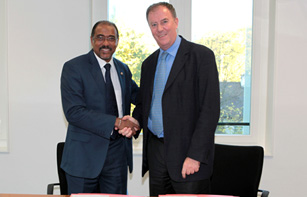
UNAIDS Executive Director, Michel Sidibé and Dr Christian MÉsenge Director of the Health Department at Senghor University of Alexandria. Credit: UNAIDS/Chironi
UNAIDS and the Senghor University of Alexandria signed an agreement of cooperation to include a 25 hour module specific to AIDS in the university’s curriculum of their Master’s degree on Health.
The memorandum of understanding was signed in Geneva on 21 October 2010 by UNAIDS Executive Director, Michel Sidibé and Mr Albert Lourde, Rector of the Senghor University.
The agreement also established that a selected group of students cursing the second year of the master’s degree will have the opportunity to undertake their mandatory 3 months internship in several UNAIDS country offices located in West and Central Africa as well as the Middle East and North Africa regions.
UNAIDS will also certify the continuing education courses organized by the University throughout the francophone Africa when such courses are related to AIDS.
This initiative is a consequence of the broader cooperation agreement between UNAIDS and the International Organisation of La Francophonie (IOF) signed in December 2009 focusing on institutional dialogue between governments, partners, stakeholders in the field and civil society. The IOF and UNAIDS strengthened their collaboration for the benefit of the peoples of the French-speaking world, specifically the most vulnerable.
The main areas of cooperation, which were identified with the Operating agencies of La Francophonie, could thus be embodied in new tailor-made agreements built around the themes of democracy and human rights, including legislative aspects of HIV, and education and research, in conjunction with the University Agency of La Francophonie (AUF) and the Senghor University of Alexandria.
This new agreement signed with Senghor University embodies the ties between UNAIDS and La Francophonie by building the capacity of the francophone countries in terms of human resources as well as raising awareness of the AIDS epidemic and UNAIDS work.

Feature Story
Emerging from conflict: women’s role in rebuilding better, fairer communities
20 October 2010
20 October 2010 20 October 2010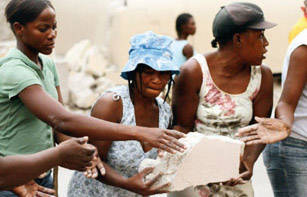
Women clearing rubble from the streets of Port-au-Prince, Haiti. Credit: UN Photo/Sophia Paris
Too often women suffer the worst consequences of war. In certain parts of the world gender-based and sexual violence are increasingly used as a weapon of conflict and are a prevalent characteristic of numerous humanitarian crises. The latest flagship report from the United Nations Population Fund (UNFPA), State of world population 2010, explores the dangerous consequences for women caught in conflict and crisis who are left vulnerable to HIV infection, disabilities, social stigma and psychological trauma.
The publication of the report, which also highlights many positive actions by individuals, civil society and governments to confront this issue, coincides with the tenth anniversary of Resolution 1325 on Women, Peace and Security. The resolution is the United Nation’s Security Council’s challenge to the abuse of women in conflict and their marginalisation in the peace building process.
Subtitled From conflict and crisis to renewal: generations of change, the report examines developments in the 10 years since this key resolution. The report is based on stories from the field in a range of countries that have experienced turmoil and are now on the sometimes rocky road to recovery: Bosnia and Herzegovina, Liberia, Timor-Leste and Uganda.
HIV in crisis situations
The impact of HIV in crisis situations is also explored. Sexual violence makes women vulnerable to HIV infection. The social instability, poverty and powerlessness that often accompany social upheaval and displacement also facilitates HIV transmission with weakening of norms regulating sexual behaviour.
Countries should not just be rebuilt, but built back better and renewed, with women and men on equal footing, with rights and opportunities for all.
Thoraya Ahmed Obaid, UNFPA’s Executive Director
The report shows how women and young people have overcome difficulties and started to rebuild their lives and their communities. In post-conflict northern Uganda, where a rebel war raged for more than 20 years, young people are working with the local branch of Straight Talk Foundation, a national NGO, which has set up the Gulu Youth Centre. It is now a major provider of sexual and reproductive health care for youth in the area, including HIV counselling and testing. This is a much-needed service for the region's young women as older teenage girls are much more likely to be living with HIV.
Women and men together for peace
There is also recognition that men play a vital role in bringing about positive change. Male traditional leaders in Africa and the Asia-Pacific region are now taking women’s rights and needs into account in decision-making.
Increasingly, women are also elected as local leaders on their own steam and take active part in re-building society in post-conflict situations. For example in Burundi and Nepal, two conflict affected countries, women in civil society have been heralded for their efforts and impact throughout the peace process.
According to the State of world population, concerned people at all levels are searching for ways to build new and healthy societies where women and girls—and men and boys—can flourish.
As Thoraya Ahmed Obaid, UNFPA’s Executive Director, said about the report, “Countries should not just be rebuilt, but built back better and renewed, with women and men on equal footing, with rights and opportunities for all.”

Feature Story
Asia-Pacific drive for increased focus on HIV and sex work
20 October 2010
20 October 2010 20 October 2010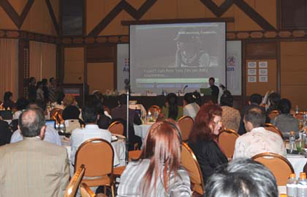
Sex workers, government officials and UN representatives joined the first-ever Asia-Pacific regional consultation on HIV and sex work. Credit: APNSW
HIV transmission via sex work accounts for many new HIV infections in the Asia-Pacific region. Yet in many countries HIV prevention, treatment and care services for sex workers are lacking. At the first consultation of its kind in the region, sex workers, government officials and United Nations participants emphasized the urgent need for action to increase focus on sex work within national HIV responses.
“I was arrested when the police saw I had condoms.” “Sex workers’ rights are being violated.” “Sex workers are going underground now. We don’t know where they are.”
These are just some of the experiences shared at the first-ever Asia-Pacific consultation on HIV and sex work, held in Pattaya, Thailand, from 12-15 October. Some 150 participants from eight countries* in the region—including sex workers, government officials, representatives from civil society and the United Nations—came together to call for a greater emphasis on ensuring universal access to HIV prevention, treatment, care and support services for sex workers.
Sex workers experience firsthand the effects of laws and harmful enforcement practices that violate their human rights and hamper progress in the HIV response.
Jan Beagle, UNAIDS Deputy-Executive Director, Management and External Relations
Hosted by the Royal Government of Thailand and co-organized by UNAIDS and UNFPA, in collaboration with the Asia-Pacific Network of Sex Workers (APNSW), meeting participants shared strategies and developed national action plans to be carried forward.
Sex work accounts for a significant number of new HIV infections in the Asia–Pacific region. An estimated 10 million Asian women sell sex to 75 million men who, in turn, have intimate relations with an additional 50 million people. In some countries in the region, HIV prevalence among sex workers is nearly 20%. Meet participants stressed that spending on HIV services is falling, despite evidence of their cost-effective impact and that only about one third of sex workers in the region are able to access HIV prevention programmes.
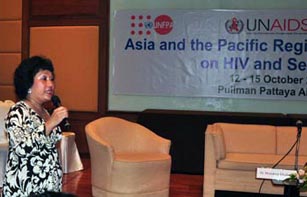
Khartini Slamah of APNSW moderates a discussion on legal and policy barriers. Credit: APNSW
Meeting participants also pointed to numerous punitive laws and policies that can prevent sex workers from accessing HIV services. “Sex workers experience firsthand the effects of laws and harmful enforcement practices that violate their human rights and hamper progress in the HIV response,” said Jan Beagle, UNAIDS Deputy-Executive Director, Management and External Relations, who attended the consultation. “Listening to sex workers is crucial.”
Participants in the consultation heard how sex workers are frequently subjected to violence and harassment, and often face criminal charges and detention. Participants said enforcement of elements within new anti-trafficking and other related laws in some countries including Cambodia, Fiji and Thailand had exacerbated this situation, citing recent cases where carrying condoms had led to arrests.
“Every day we confront brutal realities—arrest, violence, discrimination,” said Kay Thi Win, Chair of APNSW and programme manager of a successful and long-running outreach programme in Myanmar that is largely run by sex workers or former sex workers. “We want to turn the tide by demanding that initiatives designed ‘for’ us be designed ‘with’ us,” she said.
*Cambodia, China, Fiji, Indonesia, Myanmar, Pakistan, Papua New Guinea and Thailand

Feature Story
Expanding HIV services in post-conflict Liberia
20 October 2010
20 October 2010 20 October 2010
Photo: UNAIDS Executive Director Michel Sidibe, HRH Princess Mathilde of Belgium and mother of triplets at JFK hospital in Monrovia, Liberia. Credit: UNAIDS
UNAIDS Executive Director Michel Sidibé and UNAIDS and UNICEF Goodwill Ambassador HRH Princess Mathilde of Belgium, wrapped up a joint three-day mission to Liberia, which as a post-conflict country is working to expand its HIV services.
“It is a critical moment for Liberia. If we join together we can put the brakes on new HIV infections,” said Mr Sidibé. “But if we miss this opportunity the AIDS epidemic could regain momentum and more lives will be lost.”
During their trip, Mr Sidibé and HRH Princess Mathilde visited several health and educational facilities which are leading the way in the country’s re-energized AIDS response.
It is a critical moment for Liberia. If we join together we can put the brakes on new HIV infections
Michel Sidibé, UNIADS Executive Director
One site they visited was the JFK Hospital which is located in the capital city of Monrovia and offers a range of integrated HIV and maternal health services. It provides antenatal care to approximately 50 pregnant women each month, including voluntary HIV testing and counselling and services to prevent mother-to-child transmission (PMTCT) of HIV. On average, about 200 people visit the hospital’s antiretroviral therapy clinic every week for treatment and care.
Challenges of delivering HIV services in rural settings
As well as visiting hospitals in the capital, the group also paid a visit to the Phebe Hospital, a rural health facility located in the central Liberian county of Bong that provides a range of health services to around 329 000 people in four different counties. It is considered a leading provider of HIV services including antiretroviral treatment, voluntary HIV testing and counselling, PMTCT services and treatment for tuberculosis. A total of 67 people living with HIV are receiving services and 35 are on treatment.
Education is a key issue; boys and girls should be educated to show respect for one another.
HRH Princess Mathilde
However rural health facilities often face particular problems in delivering health services. For example two weeks ago the machine measuring CD4 counts, which helps monitor the progress of the virus, broke down and the hospital is unsure of when it can be fixed.
“We face many challenges. We have problems with follow up and we lose about a fifth of people who test HIV positive,” said Dr Garfee Williams, the Medical Director of Phebe Hospital. “This is due to many reasons—there are of course problems of discrimination – but also a lack of resources. We just don’t have the staff to go out into communities and provide the necessary care.”
Liberia has a generalised AIDS epidemic and latest data shows that there were around 35 000 people living with HIV at the end of 2007 and 2 300 people died of an AIDS-related illness in the same year.
Related

Feature Story
Benin, EU and UNAIDS cooperate on technical support for HIV response
19 October 2010
19 October 2010 19 October 2010MoU on the implementation of the technical support plan to the AIDS response in Benin

Ms Françoise Collet Ambassador, for the European Union in Benin, Dr Antoinette Obey Megnigbeto for the Government of Benin, and on behalf of UNAIDS Mr Baruani Kilundu Yuma signing the MoU in Benin, 14 October, 2010. Credit: UNAIDS.
On 14 October, the European Union (EU), the Government of Benin and the Joint United Nations Programme on HIV/AIDS (UNAIDS), signed a Memorandum of Understanding (MoU) on a Technical Support Plan to enhance coordination of the AIDS response in Benin and improve the implementation of the Global Fund grants.
A technical support plan maps the gaps in National AIDS responses and identifies where technical support is needed. This is essential to better coordinate and focus joint efforts for strategic and effective national responses to the HIV epidemic.
The aim of the new plan is to assist the national AIDS coordinating authority to more effectively manage, coordinate and supervise the technical support provided by national and international partner organizations.
Benin is one of the first countries in West and Central Africa with a technical support plan in operation. The plan was developed through an inclusive process, with the assistance of the Technical Support Facility for West and Central Africa and UNAIDS Regional Team in Dakar. The national government, bilateral and multilateral partners and civil society identified operational bottlenecks in the national AIDS response together. Key challenges include effective allocation of existing financial resources, weak coordination, and lack of coverage of prevention of mother-to-child transmission services. Via this process the actions needed to overcome challenges were also mapped out.
This plan will help to strengthen the coordination capacity of the national AIDS response in Benin, and improve implementation of Global Fund grants
Mr Baruani Yuma Kilundu UNAIDS Country Coordinator Benin
It is hoped that the plan’s implementation will build on this inclusive approach and further strengthen consensus among partners on how to plan and put into action HIV programmes in Benin.
The MoU was signed by Ms Françoise Collet Ambassador, Head of the Delegation of the European Union in Benin, Dr Antoinette Obey Megnigbeto Permanent Secretary of the National AIDS Committee for the Government of Benin, and on behalf of UNAIDS by Mr Baruani Kilundu Yuma, UNAIDS Country Coordinator of Benin.
“This plan will help to strengthen the coordination capacity of the national AIDS response in Benin, and improve implementation of Global Fund grants,” said Mr Baruani Yuma Kilundu at the signing of the agreement.
So far Benin has received US$ 70 million for HIV programming from the Global Fund to Fight AIDS, TB and Malaria, with another US$ 60 million to be signed for in round 9.
UNAIDS will facilitate the coordination, as well as resource mobilization to ensure the implementation of the technical support plan and the EU has approved US$ 500 000 to support its implementation over three years, 70 % of the total need.
There are an estimated 64 000 people living with HIV in the country with a prevalence of 1.2% in the general population. Significant differences are found between the urban and the rural population, and women carry the largest burden of HIV infection at 1.5% compared to 0.8% among men.
Related
 Impact of the pause of US foreign assistance in Côte d'Ivoire
Impact of the pause of US foreign assistance in Côte d'Ivoire

19 February 2025

Feature Story
Liberia launches national agenda to improve the health of women and girls
18 October 2010
18 October 2010 18 October 2010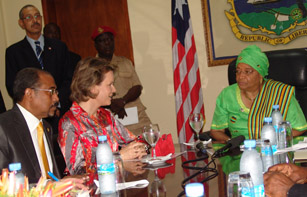
Liberian President Ellen Johnson Sirleaf, HRH Princess Mathilde of Belgium, and UNAIDS Executive Director Michel Sidibé in Monrovia 18 October, 2010. Credit: UNAIDS
Following a 14-year civil war, Liberia has faced a host of post-conflict challenges that have increased the vulnerability of women and girls to HIV infection, including gender-related violence, poverty, population displacement and limited access to education and health services.
Women and girls represent 58% of the estimated 36 000 people living with HIV in Liberia. HIV prevalence among young women aged 15-24 is about three times higher than that of young men.
Liberian President Ellen Johnson Sirleaf—Africa’s first democratically-elected female head of state—today unveiled a national roadmap for improving the health and well-being of women and girls. Launched in collaboration with HRH Princess Mathilde of Belgium, a Goodwill Ambassador for UNAIDS and UNICEF, Liberia’s new Agenda for accelerating country actions for women, girls, gender equality and HIV aims to:
- Strengthen data collection and analysis to better understand the impact of the HIV epidemic on women and girls in Liberia
- Accelerate access to integrated reproductive and HIV services for women and girls
- Contribute to broader efforts to stop violence against women and girls
Liberia’s national Agenda is based on a global plan developed by UNAIDS and partners to address the gender inequalities and human rights violations that put women and girls at a greater risk of HIV. Speaking at a launch event in Monrovia, President Sirleaf said she was proud that Liberia had been selected as the first country to roll out this national Agenda.
I congratulate President Sirleaf for embracing this Agenda—for recognizing and supporting your most valuable natural resource: women and girls
Michel Sidibé, UNAIDS Executive Director
UNAIDS Executive Director Michel Sidibé, who is on an official visit to Liberia with Princess Mathilde and UNICEF, praised Liberian authorities for placing AIDS and sexual and gender-based violence at the heart of the country’s post-war recovery efforts.
“I congratulate President Sirleaf for embracing this Agenda—for recognizing and supporting your most valuable natural resource: women and girls,” said Mr Sidibé. “Women are the solid centre of human life—of families, communities and care.”
Princess Mathilde focused her remarks on the critical importance of education in solving the nation’s ills. “Education is linked to the well-being of children,” she said. “It gives women the possibility to become economically self sufficient. It gives them the opportunity to decide on matters that concern their own lives. It gives them a voice with which to defend their own interests.”
The three-day joint mission to Liberia, which kicked off today, includes meetings with senior government authorities, associations of people living with HIV, and health and medical providers.



